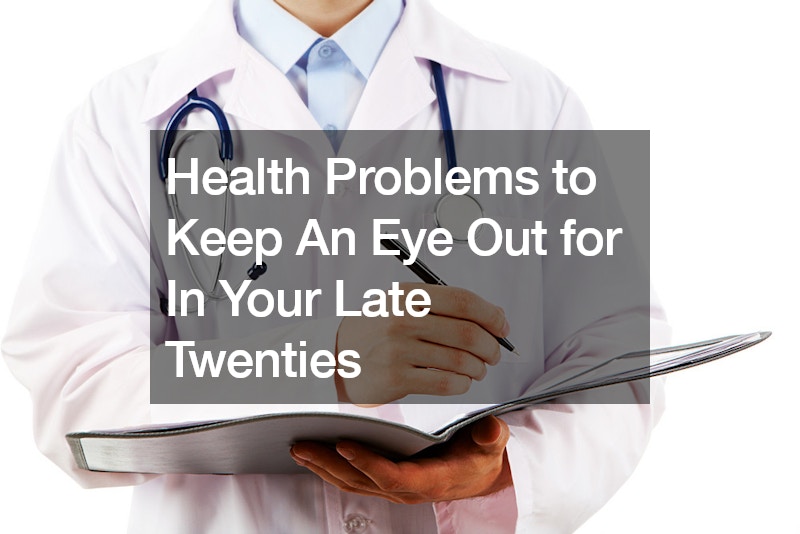
Dealing with health problems in your twenties may seem impossible, especially when you’re feeling perfectly healthy and leading an active and fit lifestyle. However, regardless of age, there are a few health problems you may need to keep an eye out for in your late twenties, especially if you have relatives who have had various illnesses or conditions that didn’t arise until later on in life. The more vigilant you are regarding your health, even in your twenties, the easier it’ll be for you to seek a doctor or medical professional at the first sign of a slowdown or a potential setback, physically or mentally.
Eye Issues

Unfortunately, one of the biggest health problems on the rise in individuals in their late twenties includes eye issues. Eye issues, from blurred vision to myopia, have become increasingly challenging among those who are younger and even those who are still in their late twenties. This is most likely attributed to the increased screen time and strain on the eyes today, especially for those who grew up using computers and screens and those who work with screens daily.
If you’re struggling with your eyes, dealing with watery eyes, or if you’re experiencing blurred vision, it’s likely time for you to make an appointment with the local eye care centre near you, depending on where you live. Visiting an eye center is a way for you to undergo basic eye vision tests to determine the current state and condition of your eyes at any age. When you see an optometrist or even an ophthalmologist, you can ask questions about your potential issues or conditions and learn more about the genetic links and familial history that may be contributing to any of the issues you’re experiencing.
Acne Conditions
If you’ve always had acne and you’ve recently noticed it making a return in your late twenties, you may need to make an appointment with trusted acne dermatologists near you to pinpoint the root cause. While acne is common during adolescence, it’s less prevalent in adults, especially those who are older than 25. To rule out underlying health problems or conditions, it’s best for you to schedule an appointment to see a local dermatologist you can trust to be thorough from the beginning of your exam to the end.
When you turn to a professional trusted dermatologist near you, ask questions about the type of acne you’re experiencing, its location, and whether the acne is spreading or caused by an external factor. While some acne is hormonal, other acnes issues may arise due to underlying autoimmune diseases, such as Hidradenitis suppurativa, or HS. Your dermatologist can conduct thorough exams and tests to determine if you may require surgery, medication, or alternative treatments to help get to the bottom of what’s causing acne outbreaks in your late twenties.
Varicose Vein Issues

Varicose veins begin to occur when the vein walls are weakened or damaged throughout the body. In most cases, varicose veins will appear throughout the arms and legs, depending on an individual’s genes and hereditary links to the issue. In most instances, varicose veins are caused by genetics, obesity, a lack of physical activity, and even chronic venous insufficiency. If you believe you’re beginning to notice varicose veins in your late twenties, you can seek help from a doctor who specializes in varicose vein removal procedures near you.
Removing varicose veins from the body is not always invasive and can be done with a simple procedure and basic recovery process, depending on the condition you’re dealing with at the time. You may also reduce the visibility of some varicose veins with proper exercise routines and by leading a healthy and active lifestyle. Working with a professional who specializes in the removal of varicose veins is also a way for you to determine the severity and potential issues of your condition, so you can prevent more varicose veins from becoming present and visually unpleasant in the future on your body.
Chronic Pain
Dealing with chronic pain is another one of the most pressing health problems that you’re not likely to expect as you enter your late twenties, especially if you’ve otherwise been healthy your entire life. If you’re dealing with chronic pain as a result of an accident, injury, or even a debilitating condition, you may want to make a pain specialist appointment to begin your journey of managing your chronic pain to maintain your quality of life. Knowing how to address chronic pain properly and without becoming reliant on prescription medication is key to truly still making the most out of any type of life you’ve envisioned for yourself, even if you’re just in your late twenties.
Seeing a chronic paint specialist is a way for you to ask questions about any conditions or pains you’ve been diagnosed with at the time. You can also learn the ins and outs of pain management, what it entails, and the type of pain medication you may be presented with based on the severity and root cause of your chronic pain and condition. Finding the right pain management clinic is crucial if you’re seeking long-term care or if you’re interested in trying alternative methods to relieve the pain you deal with on a daily basis.
Anytime you’re dealing with chronic pain, however, it’s vital to attempt to get to the root cause of the issue itself. When you’re able to identify the root cause of ongoing chronic pain or even persistent inflammation, you can then work to find natural remedies and solutions that you can incorporate at home to help reduce the strain in and on your body. The more in-tune you become with your body’s physical needs and the signs it provides to you as indicators, the easier it’ll be for you to find relief, whether you choose medication, surgery, or a homeopathic route.
Memory Loss and Early Onset Alzheimer’s

When you’re thinking of potential health problems you might face in your late twenties, the last thing on your mind is likely to be Alzheimer’s disease. However, there is a rise in early onset Alzheimer’s that doesn’t discriminate based on age. If you believe you’re dealing with memory loss or signs and symptoms that align with early onset Alzheimer’s, seeing a neurologist for a proper workup as quickly as possible is imperative.
Those who have been diagnosed with early onset Alzheimer’s are likely to feel confused and overwhelmed enough, especially those who are still in their late twenties. One of the best ways to adjust to your transition while learning more about the condition itself is to do so by seeking Alzheimer care that may be available near you. Both inpatient and outpatient Alzheimer’s care options might benefit you by adjusting to your condition and making preparations for your future, even if you are young.
Maintaining your memory and focus requires exercise, just like any muscle in the body. Spend time with various memory-oriented tasks and games that can help you improve your memory and cognitive function, even if you’ve recently been given a diagnosis of early onset Alzheimer’s. The more proactive you remain when it comes to battling your diagnosis, the easier it’ll be for you to overcome the challenges you’re likely to face as the condition progresses.
Loss of Muscle or Joint Control Due to an Accident or Condition
When it comes to health problems in your late twenties, you’re not likely to expect to lose the ability to move your muscles or joints due to an accident or even an underlying condition. However, this can occur and should be investigated by working with a team of qualified medical professionals to maintain as much of your strength and muscle mass as possible without sacrificing your quality of life. After an accident, seeing the right doctors and physical therapists can help set you up on the road to recovery.
Whether you’re interested in a dot physical or learning more about the loss of car hand control while you drive, you’ll need to seek medical guidance from a professional physical therapist or even a neurologist after being involved in a car accident. Seeing the right healthcare team can make a significant difference in receiving an accurate diagnosis and treatment plan. When you’re seeing a physical therapist regularly, and you’ve ruled out additional neurological issues, you’ll also feel much more comfortable settling into the recovery process.
Onset of Autoimmune Diseases

In your late twenties, one of the last health problems you’d expect to encounter includes a debilitating ongoing autoimmune disease. However, many autoimmune diseases occur in later adolescence and throughout adulthood, depending on genetic and environmental factors. Understanding an autoimmune disease is not always easy, as many doctors are misinformed or simply not trained in the area.
Finding a specialist near you who can help run various autoimmune tests while checking your family history is key to expediting the process of receiving a diagnosis of an autoimmune disease. Requesting autoimmune tests in addition to genetic testing is also recommended if you believe your personal issues are linked with chronic problems that are common in your family. The more familiar you become with potential genetic predispositions and risks, the easier it’ll be for you to find a doctor or specialist who understands the potential autoimmune diseases you’re dealing with at the time.
It’s important to keep in mind that if you’ve been recently diagnosed with one autoimmune disease, you’ll likely need to keep an eye out for the presentation of additional onset conditions as time passes. Most autoimmune diseases present in clusters of 5-7 conditions or subset issues, depending on the root disease you’ve been diagnosed with first. Understanding which systems in your body have been impacted most by autoimmune can go a long way in finding the right treatments and/or lifestyles for you.
Hormonal Imbalances
Hormonal imbalances is another one of the most important health problems to pay attention to if you believe your hormones are becoming increasingly imbalanced, even well into your late twenties. Without correction, a hormonal imbalance can cause you to experience a wide range of unpleasant mental, emotional, and even physical side effects. Hormonal imbalances may require endocrine disruptor testing, whether you’re a male or female.
If you do have a hormonal imbalance in the body, you may be referred to another doctor for low testosterone treatment or even ongoing estrogen therapy, depending on the initial levels of the hormones discovered in your body. Ongoing blood draws, and routine therapy appointments can help replenish your body’s natural hormonal balance. Working with the right endocrinologist is also a way for you to learn more about your body’s specific hormonal regulation issue and the potential root causes of it.
Cancer or Terminal Illness
Unfortunately, cancer and terminal illnesses do not discriminate, and it’s possible for you to receive a diagnosis even if you’re only in your twenties. Because being diagnosed with late-stage cancer or a terminal illness can be stressful and emotionally taxing enough, it might be ideal for you to begin researching a local hospice care provider that’s close to home and appealing to you. Although the idea of hospice may sound frightening, it can ultimately provide you with more comfort and peace as you navigate your diagnosis.
Finding the right hospice location for your needs can help you feel welcomed and in an environment that is pleasant for you, regardless of the diagnosis you’ve received. With the right hospice care, minimal pain will be experienced, and your needs will be met each day. When researching hospice options and locations near you, be sure to compare amenities, services, and testimonials from patients themselves to find a solution that is optimal for you.
Confronting any health problems you’ve been diagnosed with or are experiencing for the first time in your twenties can be devastating and overwhelming, especially if you’ve been relatively healthy up until now. Knowing how to find a proper specialist or care provider for your needs can be crucial to ensuring your own mental health and balance at home. Even if you’re in your twenties, remaining aware and cognizant of potential risks based on genetic factors and familial history can go a long way in helping you prevent major illnesses or conditions from impacting your future and quality of life.



